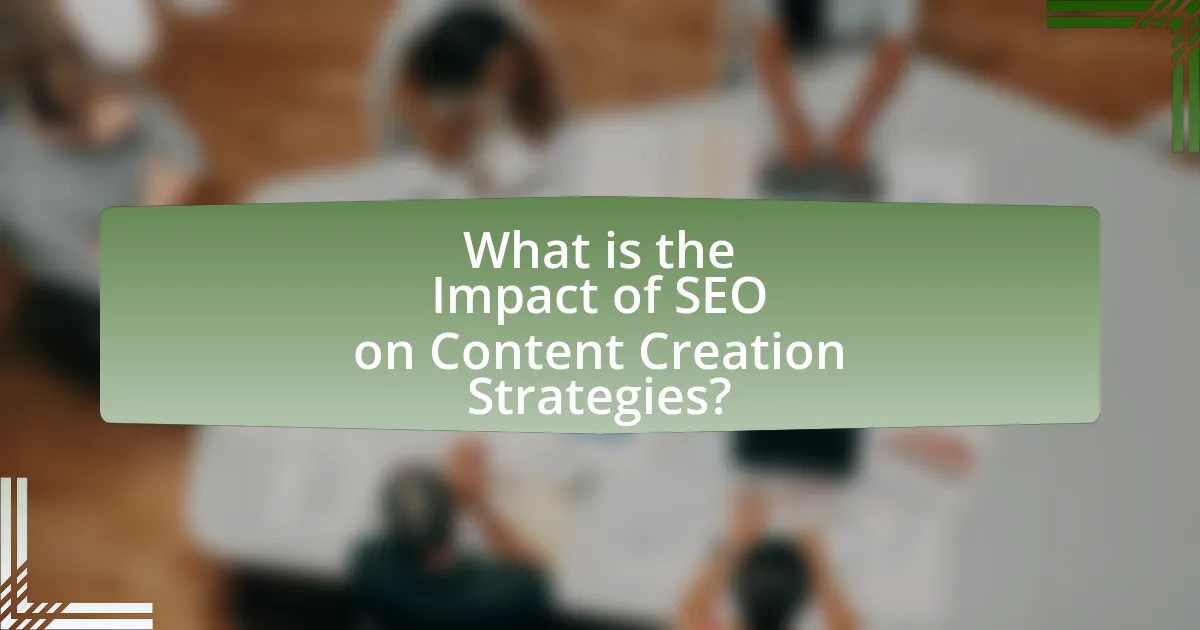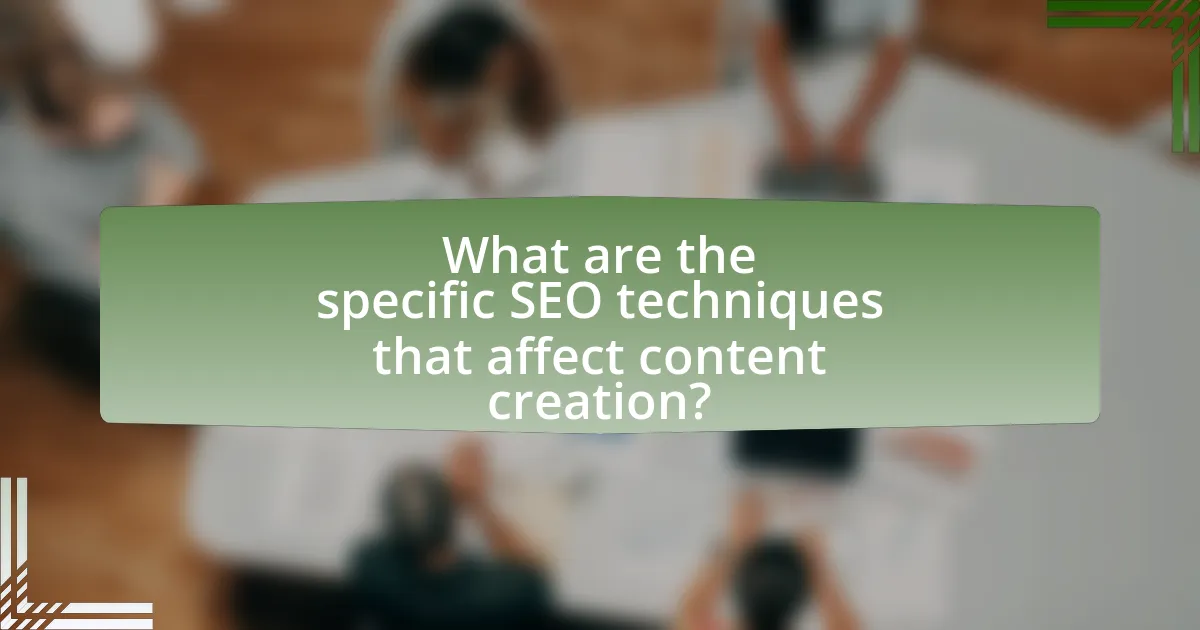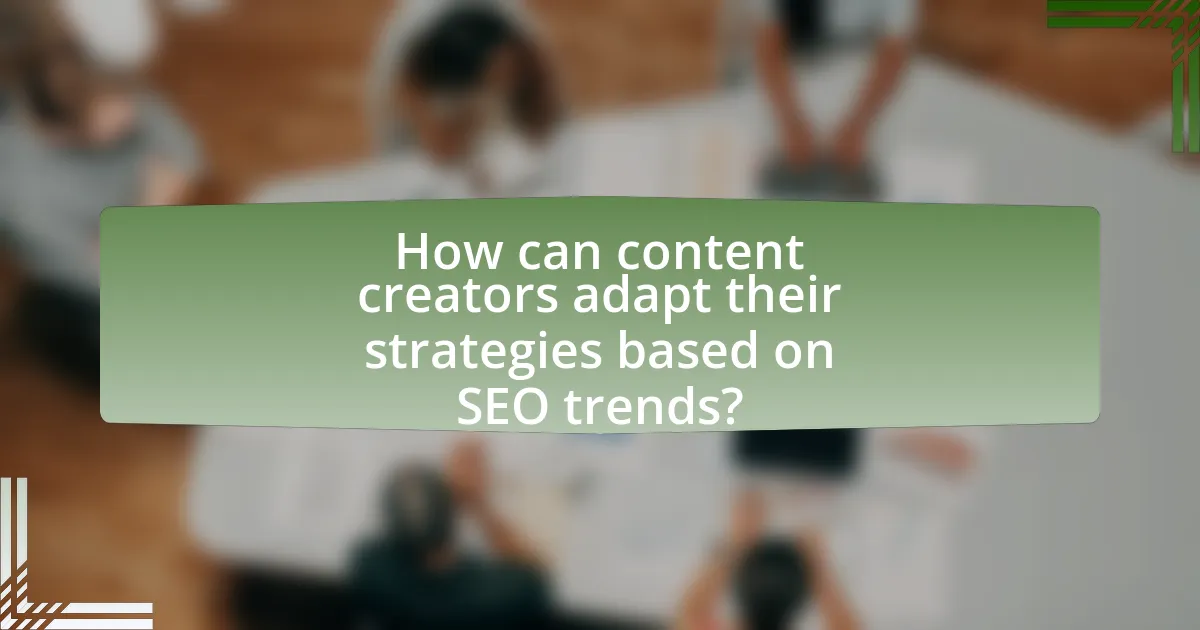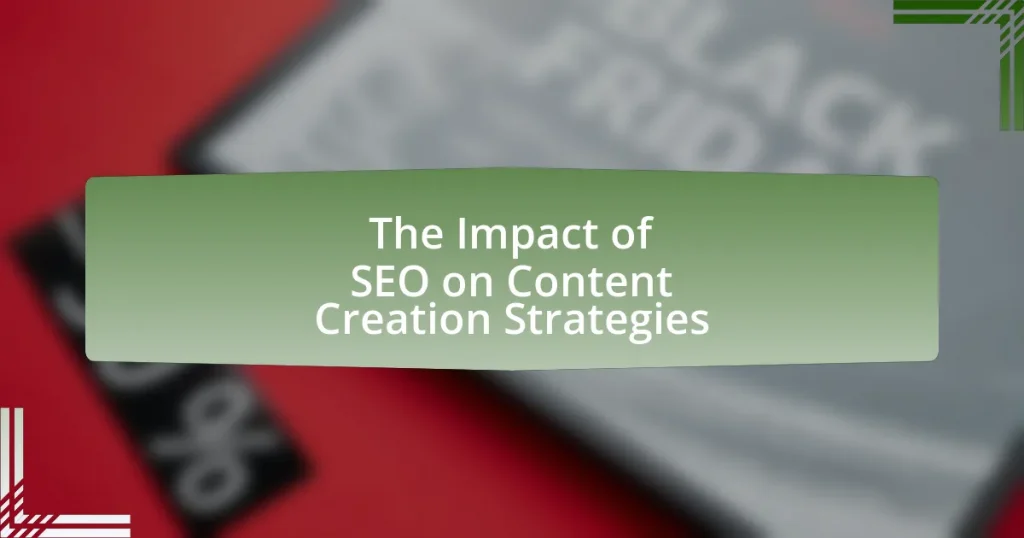The article examines the significant impact of SEO on content creation strategies, emphasizing the importance of keyword optimization, user intent, and content structure. It highlights how SEO influences the overall content creation process, guiding topics and enhancing visibility in search engine results. Key elements such as keyword research, on-page optimization, and content quality are discussed, along with the role of search engine algorithms in shaping effective content strategies. The article also addresses the necessity for content creators to understand SEO to improve visibility, engagement, and overall performance, while outlining best practices and current trends that can enhance content relevance and effectiveness.

What is the Impact of SEO on Content Creation Strategies?
SEO significantly influences content creation strategies by prioritizing keyword optimization, user intent, and content structure. This impact leads content creators to focus on producing high-quality, relevant content that aligns with search engine algorithms. For instance, a study by HubSpot found that 70% of marketers actively invest in SEO, indicating its critical role in shaping content strategies. Additionally, SEO encourages the use of data analytics to refine content based on performance metrics, ensuring that content not only attracts traffic but also engages users effectively.
How does SEO influence the overall content creation process?
SEO significantly influences the overall content creation process by guiding the topics, structure, and optimization of content to enhance visibility in search engine results. By incorporating keyword research, content creators can identify relevant terms that potential audiences are searching for, ensuring that the content aligns with user intent. Additionally, SEO best practices, such as optimizing headings, meta descriptions, and internal linking, help improve the content’s discoverability and user engagement. According to a study by HubSpot, 61% of marketers say improving SEO and growing their organic presence is their top inbound marketing priority, highlighting the critical role SEO plays in shaping effective content strategies.
What are the key elements of SEO that affect content creation?
The key elements of SEO that affect content creation include keyword research, on-page optimization, content quality, user experience, and backlinks. Keyword research identifies the terms and phrases that potential audiences use, guiding content topics and structure. On-page optimization involves using these keywords effectively in titles, headings, and throughout the content to improve search engine visibility. High-quality content, which is informative and engaging, is essential for attracting and retaining users, as search engines prioritize valuable content. User experience, including site speed and mobile-friendliness, influences how users interact with content, impacting rankings. Lastly, backlinks from reputable sites enhance credibility and authority, further boosting SEO performance. These elements collectively shape effective content strategies that align with search engine algorithms and user expectations.
How do search engine algorithms shape content strategies?
Search engine algorithms shape content strategies by determining how content is ranked and displayed in search results. These algorithms assess various factors such as keyword relevance, content quality, user engagement, and backlinks to evaluate the value of content. For instance, Google’s algorithm updates, like the Panda and Penguin updates, have emphasized the importance of high-quality, original content and penalized low-quality or spammy content. This has led content creators to prioritize producing valuable, informative, and engaging material that meets user intent, thereby aligning their strategies with the evolving criteria set by search engines.
Why is understanding SEO crucial for content creators?
Understanding SEO is crucial for content creators because it directly influences the visibility and reach of their content online. By optimizing content for search engines, creators can increase organic traffic, which is essential for audience growth and engagement. According to a study by HubSpot, 75% of users never scroll past the first page of search results, highlighting the importance of ranking high in search engine results. Additionally, effective SEO practices can enhance user experience, leading to higher retention rates and conversions. Therefore, a solid grasp of SEO enables content creators to strategically position their work in a competitive digital landscape.
What are the potential consequences of neglecting SEO in content creation?
Neglecting SEO in content creation can lead to decreased visibility and traffic to the content. Without proper SEO practices, content may not rank well in search engine results, resulting in fewer organic visitors. According to a study by HubSpot, 75% of users never scroll past the first page of search results, highlighting the importance of ranking. Additionally, neglecting SEO can result in poor user engagement and higher bounce rates, as users may not find the content relevant to their search queries. This ultimately affects brand credibility and can lead to lost revenue opportunities, as potential customers are unable to discover the content.
How can SEO knowledge enhance content visibility and engagement?
SEO knowledge enhances content visibility and engagement by optimizing content for search engines, which increases its chances of appearing in relevant search results. When content is strategically structured with targeted keywords, meta tags, and quality backlinks, it becomes more discoverable to users actively searching for related information. According to a study by HubSpot, 75% of users never scroll past the first page of search results, highlighting the importance of SEO in capturing audience attention. Furthermore, well-optimized content tends to have higher click-through rates and lower bounce rates, leading to increased user engagement. This correlation between SEO practices and user interaction is supported by data from Moz, which indicates that higher-ranking pages receive significantly more organic traffic, thereby enhancing overall engagement metrics.

What are the specific SEO techniques that affect content creation?
Specific SEO techniques that affect content creation include keyword research, on-page optimization, content structure, and link building. Keyword research identifies relevant terms that users search for, guiding content topics and ensuring alignment with audience interests. On-page optimization involves using keywords strategically in titles, headings, and throughout the content to enhance visibility in search engine results. Content structure, including the use of headings, bullet points, and images, improves readability and user engagement, which are factors that search engines consider for ranking. Link building, both internal and external, enhances the authority of the content, as search engines view links as endorsements of quality. These techniques collectively improve the chances of content being discovered and ranked favorably in search results.
How do keyword research and optimization play a role in content strategy?
Keyword research and optimization are essential components of content strategy as they guide the creation of relevant and targeted content that meets user intent. By identifying high-traffic keywords and understanding search trends, content creators can align their topics with what audiences are actively searching for, thereby increasing visibility and engagement. For instance, a study by HubSpot found that companies that prioritize keyword research in their content strategy see a 55% increase in website traffic. This demonstrates that effective keyword optimization not only enhances search engine rankings but also drives organic traffic, ultimately contributing to the overall success of a content strategy.
What tools can assist in effective keyword research?
Effective keyword research can be assisted by tools such as Google Keyword Planner, SEMrush, Ahrefs, and Moz. Google Keyword Planner provides insights into search volume and competition for keywords, making it essential for identifying relevant terms. SEMrush offers comprehensive keyword analysis, including trends and difficulty scores, which helps in strategic planning. Ahrefs is known for its extensive database and features like keyword difficulty and click-through rate estimates, aiding in selecting optimal keywords. Moz provides keyword suggestions and SERP analysis, enhancing the understanding of keyword performance. These tools are widely recognized in the SEO community for their effectiveness in optimizing content strategies.
How should keywords be integrated into content without compromising quality?
Keywords should be integrated into content naturally and contextually to maintain quality. This involves using keywords in a way that enhances the readability and relevance of the content, rather than forcing them into the text. For instance, placing keywords in headings, subheadings, and the first 100 words of the content can improve SEO without detracting from the overall flow. Research indicates that content that reads well and provides value to the reader tends to rank higher in search engine results, as search algorithms prioritize user experience. Therefore, balancing keyword usage with engaging, informative writing is essential for effective SEO strategies.
What is the significance of on-page SEO in content creation?
On-page SEO is significant in content creation because it directly influences how search engines rank web pages and how users interact with content. By optimizing elements such as title tags, meta descriptions, headers, and keyword usage, content becomes more discoverable and relevant to search queries. Research indicates that 75% of users never scroll past the first page of search results, highlighting the importance of on-page SEO in attracting organic traffic. Furthermore, effective on-page SEO enhances user experience by improving page load speed and mobile responsiveness, which are critical factors in retaining visitors and reducing bounce rates.
How do meta tags and descriptions impact content performance?
Meta tags and descriptions significantly impact content performance by influencing search engine rankings and click-through rates. Meta tags, including title tags and meta descriptions, provide search engines with essential information about the content of a webpage, which helps in indexing and ranking. According to a study by Backlinko, pages with optimized title tags rank 36% higher in search results. Additionally, compelling meta descriptions can increase click-through rates by up to 5.8%, as they serve as a preview of the content, enticing users to click. Therefore, effective use of meta tags and descriptions directly correlates with improved visibility and engagement of content.
What role does content structure play in SEO effectiveness?
Content structure significantly enhances SEO effectiveness by improving readability and user experience, which are critical factors for search engine rankings. A well-organized content structure, including the use of headings, subheadings, bullet points, and short paragraphs, allows search engines to better understand the context and relevance of the content. Research indicates that websites with clear content hierarchies and logical flow tend to have lower bounce rates and higher engagement metrics, which positively influence SEO performance. For instance, a study by Backlinko found that content with proper formatting and structure can lead to a 50% increase in organic traffic. Thus, effective content structure not only aids in user navigation but also aligns with search engine algorithms that prioritize user-friendly content.

How can content creators adapt their strategies based on SEO trends?
Content creators can adapt their strategies based on SEO trends by continuously analyzing keyword performance and adjusting content to align with search intent. For instance, utilizing tools like Google Trends and SEMrush allows creators to identify emerging keywords and topics that resonate with their audience. By integrating these keywords naturally into their content, creators can enhance visibility and engagement. Additionally, staying updated on algorithm changes, such as Google’s Core Web Vitals update, enables creators to optimize site speed and mobile-friendliness, which are critical ranking factors. Research indicates that websites adhering to these SEO best practices see a significant increase in organic traffic, validating the importance of adapting strategies to current SEO trends.
What are the current SEO trends that content creators should be aware of?
Current SEO trends that content creators should be aware of include the increasing importance of user experience, the rise of AI-generated content, and the focus on E-A-T (Expertise, Authoritativeness, Trustworthiness). User experience is critical as search engines prioritize websites that provide seamless navigation and fast loading times; for instance, Google’s Core Web Vitals metrics directly influence rankings. AI-generated content is becoming more prevalent, with tools like ChatGPT assisting in content creation, but quality and originality remain essential to avoid penalties. Additionally, E-A-T is vital for content credibility, especially in YMYL (Your Money Your Life) niches, where Google emphasizes content from authoritative sources. These trends reflect the evolving landscape of SEO, necessitating that content creators adapt their strategies accordingly.
How can content be optimized for voice search and mobile devices?
Content can be optimized for voice search and mobile devices by focusing on natural language, concise answers, and mobile-friendly formatting. Voice search typically involves conversational queries, so content should incorporate long-tail keywords and phrases that reflect how users speak. For example, instead of targeting “best pizza,” content should include phrases like “What is the best pizza near me?”
Additionally, content should be structured for quick readability on mobile devices, utilizing short paragraphs, bullet points, and headers to enhance user experience. According to Google, 70% of mobile searches lead to action within an hour, emphasizing the need for immediate and relevant information. Furthermore, optimizing for local SEO is crucial, as 46% of voice search users look for local information. By ensuring that content is easily accessible and answers common questions, it can effectively cater to both voice search and mobile users.
What emerging technologies are influencing SEO and content creation?
Artificial intelligence, voice search, and blockchain technology are emerging technologies significantly influencing SEO and content creation. Artificial intelligence enhances content personalization and optimization through algorithms that analyze user behavior and preferences, leading to more relevant content delivery. Voice search technology is reshaping SEO strategies as it requires a focus on natural language processing and conversational keywords, reflecting how users verbally query information. Blockchain technology is improving transparency and trust in content creation by providing verifiable data on content ownership and authenticity, which can enhance credibility and user engagement. These technologies are reshaping how content is created, optimized, and delivered, aligning with evolving user expectations and search engine algorithms.
What best practices should content creators follow to align with SEO?
Content creators should focus on keyword research, quality content, and proper on-page optimization to align with SEO. Conducting thorough keyword research helps identify relevant terms that potential audiences are searching for, which can guide content creation. Producing high-quality, engaging content that provides value to readers increases the likelihood of shares and backlinks, both of which are critical for SEO performance. Additionally, implementing on-page optimization techniques, such as using appropriate title tags, meta descriptions, and header tags, ensures that search engines can effectively crawl and index the content. According to a study by HubSpot, companies that prioritize blogging are 13 times more likely to achieve a positive ROI, demonstrating the importance of these practices in driving traffic and improving search rankings.
How can regular content audits improve SEO performance?
Regular content audits can significantly improve SEO performance by identifying outdated, underperforming, or irrelevant content, allowing for optimization and enhancement. By systematically reviewing content, businesses can ensure that their material aligns with current SEO best practices, such as keyword relevance, user engagement metrics, and content freshness. For instance, a study by HubSpot found that companies that regularly update their content see a 55% increase in website traffic. This increase is attributed to improved search engine rankings, as search engines favor fresh and relevant content. Additionally, content audits help in identifying gaps in content strategy, enabling the creation of new, targeted content that meets user needs and enhances overall site authority.
What strategies can be implemented to keep content fresh and relevant?
To keep content fresh and relevant, regularly updating existing content and incorporating current trends is essential. This strategy involves revisiting older articles, enhancing them with new information, and optimizing them for current SEO practices. For example, a study by HubSpot found that updating blog posts can increase organic traffic by up to 106%. Additionally, leveraging social media insights to identify trending topics can guide content creation, ensuring alignment with audience interests. Engaging with audience feedback and analytics also helps refine content strategies, making them more relevant over time.
What practical tips can enhance the synergy between SEO and content creation?
To enhance the synergy between SEO and content creation, focus on keyword research and integration. Conduct thorough keyword research to identify relevant terms and phrases that your target audience is searching for, and seamlessly incorporate these keywords into your content. This practice not only improves search engine rankings but also ensures that the content addresses the needs and interests of users. According to a study by HubSpot, businesses that prioritize SEO in their content strategy experience 13 times more ROI than those that do not, highlighting the effectiveness of this approach. Additionally, optimizing meta tags, headers, and image alt texts with targeted keywords further strengthens the connection between SEO and content, leading to improved visibility and engagement.




